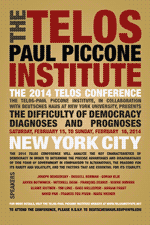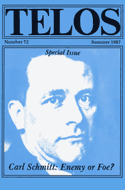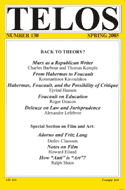By Mark S. Weiner · Thursday, April 10, 2014 The following paper was presented at the Eighth Annual Telos Conference, held on February 15–16, 2014, in New York City.
 As the final speaker after a fascinating day of talks, I’ll keep my comments brief. I’ll be addressing two questions about democracy raised by our conference description: first, “the reasons for its rarity and volatility”; and, second, “the factors that are essential for its stability.” For each question, I’ll try to provide a concise, mildly provocative answer from my perspective as a writer and scholar about constitutional law and comparative legal history. As the final speaker after a fascinating day of talks, I’ll keep my comments brief. I’ll be addressing two questions about democracy raised by our conference description: first, “the reasons for its rarity and volatility”; and, second, “the factors that are essential for its stability.” For each question, I’ll try to provide a concise, mildly provocative answer from my perspective as a writer and scholar about constitutional law and comparative legal history.
So why is democracy so rare and volatile? I think one answer we could give to this question is that democracy is volatile because the modern self is a legal achievement. There is nothing outside of law, including individual subjectivity. Instead, the modern self that lies at the center of liberal democratic practice developed only after a long historical process of dialectical negation and synthesis. In that process, a handful of societies, beginning in western Europe, transcended what in my most recent book I call the “rule of the clan.”
Continue reading →
By Linas Jokubaitis · Tuesday, January 28, 2014 As an occasional feature on TELOSscope, we highlight a past Telos article whose critical insights continue to illuminate our thinking and challenge our assumptions. Today, Linas Jokubaitis looks at Carl Schmitt’s “The Legal World Revolution” from Telos 72 (Summer 1987).
 Carl Schmitt wrote “The Legal World Revolution” when he was ninety years old, and it turned out to have been his last publication. New political developments had forced him to restate some of his old positions, the most important of which was the relationship between legitimacy, legality, and super-legality. The guiding theme of Schmitt’s final publication was the one that had been of the highest importance during his whole career. It is best summarized in notes posthumously published as Glossarium, in a passage entitled “The Diagnostic and Prognostic of Max Weber,” where Schmitt quoted from Weber’s “Sociology of Law”: “As a result of technical and economic development, it is inevitable that current law is destined to be conceived more and more as a rational technical mechanism which can be modified at any time for functional purposes, and is lacking in any kind of sacred content. The destiny may be hidden by the suppleness of belief of the current law, but cannot be truly avoided.” Carl Schmitt wrote “The Legal World Revolution” when he was ninety years old, and it turned out to have been his last publication. New political developments had forced him to restate some of his old positions, the most important of which was the relationship between legitimacy, legality, and super-legality. The guiding theme of Schmitt’s final publication was the one that had been of the highest importance during his whole career. It is best summarized in notes posthumously published as Glossarium, in a passage entitled “The Diagnostic and Prognostic of Max Weber,” where Schmitt quoted from Weber’s “Sociology of Law”: “As a result of technical and economic development, it is inevitable that current law is destined to be conceived more and more as a rational technical mechanism which can be modified at any time for functional purposes, and is lacking in any kind of sacred content. The destiny may be hidden by the suppleness of belief of the current law, but cannot be truly avoided.”
Continue reading →
By Charles Kollmer · Monday, July 11, 2011 As an occasional feature on TELOSscope, we highlight a past Telos article whose critical insights continue to illuminate our thinking and challenge our assumptions. Today, Charles Kollmer looks at Alexandre Lefebvre’s “A New Image of Law: Deleuze and Jurisprudence,” from Telos 130 (Spring 2005).
 Even readers with a cursory familiarity with Gilles Deleuze’s work will have no trouble surmising his critical attitude toward the law. As an abstracting and generalizing social force, law seems to stand in stark opposition to watchwords like immanence and singularity that pervade Deleuze’s texts. In “A New Image of Law: Deleuze and Jurisprudence,” Alexandre Lefebvre offers a novel interpretation of this antagonism toward the law, starting by distinguishing between law and jurisprudence. As the philosophy that informs the practice of law, jurisprudence interrupts the stasis of the legal code by actively applying it to a case. In turn, a given case takes on a genetic role in future versions of the law (conventionally referred to as precedent). Jurisprudence liberates law from appeals to transcendent values by insisting on its relevance to the here-and-now, as well as its role in the genesis of the yet-to-come. In his article, Lefebvre elaborates on this dynamic, starting with a summary of Deleuzian critiques of law, then moving toward what he terms “a new image of law,” drawing on Henri Bergson’s metaphysics in the process. Even readers with a cursory familiarity with Gilles Deleuze’s work will have no trouble surmising his critical attitude toward the law. As an abstracting and generalizing social force, law seems to stand in stark opposition to watchwords like immanence and singularity that pervade Deleuze’s texts. In “A New Image of Law: Deleuze and Jurisprudence,” Alexandre Lefebvre offers a novel interpretation of this antagonism toward the law, starting by distinguishing between law and jurisprudence. As the philosophy that informs the practice of law, jurisprudence interrupts the stasis of the legal code by actively applying it to a case. In turn, a given case takes on a genetic role in future versions of the law (conventionally referred to as precedent). Jurisprudence liberates law from appeals to transcendent values by insisting on its relevance to the here-and-now, as well as its role in the genesis of the yet-to-come. In his article, Lefebvre elaborates on this dynamic, starting with a summary of Deleuzian critiques of law, then moving toward what he terms “a new image of law,” drawing on Henri Bergson’s metaphysics in the process.
Continue reading →
|
|
 As the final speaker after a fascinating day of talks, I’ll keep my comments brief. I’ll be addressing two questions about democracy raised by our conference description: first, “the reasons for its rarity and volatility”; and, second, “the factors that are essential for its stability.” For each question, I’ll try to provide a concise, mildly provocative answer from my perspective as a writer and scholar about constitutional law and comparative legal history.
As the final speaker after a fascinating day of talks, I’ll keep my comments brief. I’ll be addressing two questions about democracy raised by our conference description: first, “the reasons for its rarity and volatility”; and, second, “the factors that are essential for its stability.” For each question, I’ll try to provide a concise, mildly provocative answer from my perspective as a writer and scholar about constitutional law and comparative legal history.  Carl Schmitt wrote “The Legal World Revolution” when he was ninety years old, and it turned out to have been his last publication. New political developments had forced him to restate some of his old positions, the most important of which was the relationship between legitimacy, legality, and super-legality. The guiding theme of Schmitt’s final publication was the one that had been of the highest importance during his whole career. It is best summarized in notes posthumously published as Glossarium, in a passage entitled “The Diagnostic and Prognostic of Max Weber,” where Schmitt quoted from Weber’s “Sociology of Law”: “As a result of technical and economic development, it is inevitable that current law is destined to be conceived more and more as a rational technical mechanism which can be modified at any time for functional purposes, and is lacking in any kind of sacred content. The destiny may be hidden by the suppleness of belief of the current law, but cannot be truly avoided.”
Carl Schmitt wrote “The Legal World Revolution” when he was ninety years old, and it turned out to have been his last publication. New political developments had forced him to restate some of his old positions, the most important of which was the relationship between legitimacy, legality, and super-legality. The guiding theme of Schmitt’s final publication was the one that had been of the highest importance during his whole career. It is best summarized in notes posthumously published as Glossarium, in a passage entitled “The Diagnostic and Prognostic of Max Weber,” where Schmitt quoted from Weber’s “Sociology of Law”: “As a result of technical and economic development, it is inevitable that current law is destined to be conceived more and more as a rational technical mechanism which can be modified at any time for functional purposes, and is lacking in any kind of sacred content. The destiny may be hidden by the suppleness of belief of the current law, but cannot be truly avoided.”  Even readers with a cursory familiarity with Gilles Deleuze’s work will have no trouble surmising his critical attitude toward the law. As an abstracting and generalizing social force, law seems to stand in stark opposition to watchwords like immanence and singularity that pervade Deleuze’s texts. In “A New Image of Law: Deleuze and Jurisprudence,” Alexandre Lefebvre offers a novel interpretation of this antagonism toward the law, starting by distinguishing between law and jurisprudence. As the philosophy that informs the practice of law, jurisprudence interrupts the stasis of the legal code by actively applying it to a case. In turn, a given case takes on a genetic role in future versions of the law (conventionally referred to as precedent). Jurisprudence liberates law from appeals to transcendent values by insisting on its relevance to the here-and-now, as well as its role in the genesis of the yet-to-come. In his article, Lefebvre elaborates on this dynamic, starting with a summary of Deleuzian critiques of law, then moving toward what he terms “a new image of law,” drawing on Henri Bergson’s metaphysics in the process.
Even readers with a cursory familiarity with Gilles Deleuze’s work will have no trouble surmising his critical attitude toward the law. As an abstracting and generalizing social force, law seems to stand in stark opposition to watchwords like immanence and singularity that pervade Deleuze’s texts. In “A New Image of Law: Deleuze and Jurisprudence,” Alexandre Lefebvre offers a novel interpretation of this antagonism toward the law, starting by distinguishing between law and jurisprudence. As the philosophy that informs the practice of law, jurisprudence interrupts the stasis of the legal code by actively applying it to a case. In turn, a given case takes on a genetic role in future versions of the law (conventionally referred to as precedent). Jurisprudence liberates law from appeals to transcendent values by insisting on its relevance to the here-and-now, as well as its role in the genesis of the yet-to-come. In his article, Lefebvre elaborates on this dynamic, starting with a summary of Deleuzian critiques of law, then moving toward what he terms “a new image of law,” drawing on Henri Bergson’s metaphysics in the process. 

